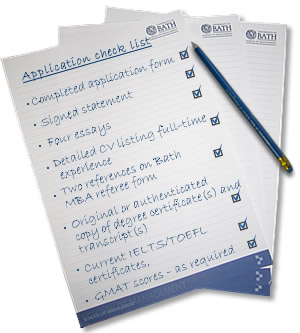Every year thousands of people worldwide apply for MBA programs. If one of those people is about to be you, you are probably concerned about how your application will come across. Here are some tips to help you look your best on paper.
 Know Where You Are Going
Know Where You Are Going
If you have no idea why you are applying for an MBA, maybe the program is not for you. That is one of the things your application committee will consider when making their decision. Know where you want to go when you graduate and be prepared to tell them. Even better, set some goals–both long term and short term–and outline them for the committee.
Know Where You Have Been
The application committee will depend on your past as an indicator of your future, so make sure you outline past accomplishments and achievements. One of the things the committee will like to see is leadership success–show that you can manage yourself first and others second.
Remember that you also have faults and past failures–explain those to the committee rather than coming across as narcissistic or someone who is trying to hide flaws.
What Makes You Different?
Of course your history is probably very much like the rest of the applicants, but there will be attractive things about you that will set you apart from the herd. You may have received an award or promotion, or some other kind of recognition. Maybe you sang in front of thousands at Carnegie Hall, which shows your ability to perform under pressure.
Keep the Application About You
Nothing turns off an application committee more than “kissing up.” Don’t just write what you think they want you to write. Also, avoid flattering the school, program, or instructors. They are well aware of their contributions to the field, and assume you do simply because you are applying there. Show the committee your own history at its best, as well as your possible future.
Although you are trying to present as much information about yourself as possible, remember that you are also trying to be personable and friendly. Of course you want to sound professional, but also maintain a conversational aspect to your writing, as if you and the committee are at a business lunch.
It boils down to sales principles: get their attention, get them interested in you, then make them want you to be part of the program. If you follow these guidelines, you will be one step ahead of your competition.


